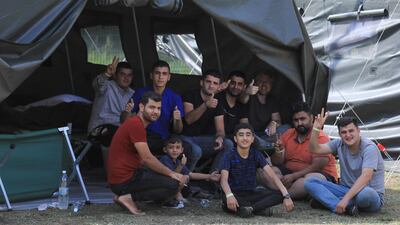The EU could tighten sanctions on Belarus amid increasing tension between Brussels and the ex-Soviet state, the bloc’s foreign policy chief said on Sunday.
Josep Borrell accused Minsk of flouting international norms by by ferrying thousands of Iraqi migrants to the EU border.
He said the EU “stands ready to consider further measures” in light of the country’s “blatant disregard of international commitments”.
Monday marks a year since Alexander Lukashenko was re-elected in Belarus, sparking mass protests and forcing opposition figures to flee or face arrest.
The crisis deepened when Belarus diverted a Ryanair flight from Lithuania to Minsk and arrested two of its passengers.
Last week, Minsk said a badly injured Iraqi man had been found near its border with Lithuania and that the man, who later died, had been attacked within the EU state. Vilnius denied this.
Mr Borrell said the Ryanair incident and the border dispute showed Belarus’s government had “further challenged international norms”.
He said the regime of President Alexander Lukashenko had repressed and intimidated its opponents.
After the election last year, which was widely regarded as rigged, the EU’s 27 member states imposed four rounds of sanctions on Belarus.
“A reversal of EU sanctions will only be possible once the authorities in Belarus fully adhere to the principles of democracy and the rule of law, respect human rights obligations and cease all repression,” Mr Borrell said.
“The regime should release and rehabilitate unconditionally the more than 600 political prisoners, and engage in a serious, credible and inclusive political process resulting in free and fair elections.”
Brussels has earmarked €3 billion ($3.53bn) in economic aid for Belarus if its demands to become more democratic are met.
But tension with the current regime mounted after thousands of migrants crossed its border into Lithuania, compared with only a few dozen last year.
The EU suspects Belarus of organising the wave of new arrivals to retaliate against sanctions. Mr Lukashenko denies this.
Brussels has sent dozens of guards to the frontier and held talks with Baghdad to stem the flow of migrants.
Lithuania has sheltered a number of Belarusian dissidents, including the opposition leader Sviatlana Tsikhanouskaya.
Critics say its refusal to allow migrants to enter from Belarus leaves them in a dangerous limbo.


